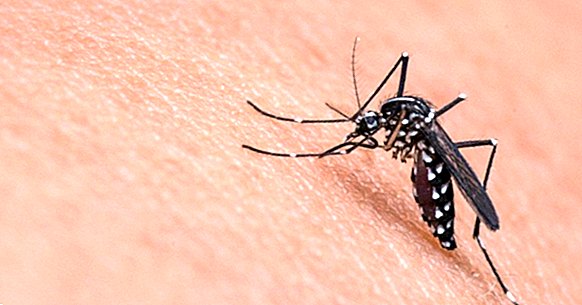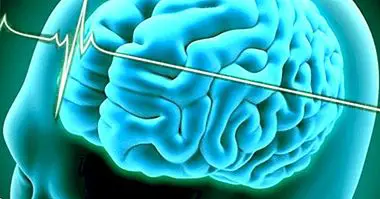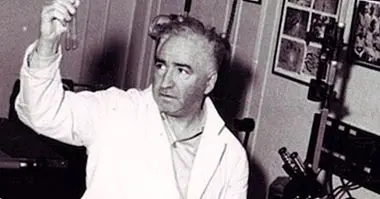Japanese encephalitis: symptoms, causes and epidemiology
One of the most common viral-type infectious diseases in Asia is Japanese encephalitis. Although outbreaks are usually controlled by mass vaccination and the symptoms are usually not severe, in some cases this virus is associated with a dangerous inflammation of the brain that can leave significant sequels or even cause death.
In this article we will describe what Japanese encephalitis is, what causes it and what are its symptoms and main signs. We will also explain in which places this disease appears frequently and what measures can be taken to prevent contracting it, as well as the care that is usually recommended in case it develops.
- Related article: "Encephalitis: causes, symptoms, treatment and prognosis"
What is Japanese encephalitis?
Japanese encephalitis is an infectious disease that is contracted through mosquito bites . It is caused by an endemic virus from 24 countries in eastern, southern and southeastern Asia, as well as the islands of the Western Pacific.
In places like China, Thailand, Korea, Vietnam, India, Indonesia, the Philippines, Taiwan, Myanmar, Sri Lanka, Cambodia, Laos, Nepal or Malaysia the cases of Japanese encephalitis are very common, although there are vaccines to prevent them; Interestingly, in Japan this disease is rare due to the effectiveness of immunization programs.
The virus that causes Japanese encephalitis it is classified in the flavivirus family , which also belong to yellow fever, dengue fever, West Nile virus and those that cause some types of hepatitis.
Although in a large part of the cases the virus does not cause the appearance of severe symptoms, more than a third of people with Japanese encephalitis suffer permanent sequelae and approximately 30% die of the alterations derived from cerebral inflammation.
- Maybe you are interested: "Meningitis: causes, symptoms, treatment and prognosis"
Signs and symptoms
In most cases, the Japanese encephalitis virus does not cause any symptoms, or there is only headache and fever. But nevertheless, Sometimes inflammation of the brain develops (encephalitis) that can become serious.
In one out of every 100 or 250 cases the infection progresses to a disease that appears between 5 and 15 days after the mosquito bite and can endanger the person's life. The symptoms and signs characteristic of this phase are the following :
- Headache
- Intense fever
- Vomiting
- Disorientation
- Tremors
- Seizures
- Rigidity in the neck
- Spastic paralysis
- Cerebral coma
Just under a third of people infected with Japanese encephalitis are permanently affected by this virus. It is common for them to sequelae related to neurological disorders , such as partial paralysis, loss of speech and cognitive and behavioral disorders.
Causes and epidemiology
Japanese encephalitis is transmitted mainly through the mosquito species Culex tritaeniorhynchus and Culex vishnui. Animals like farm pigs and herons carry the virus frequently ; mosquitoes infect people and other animals, especially horses, through their bites.
The disease affects mainly populations of rural areas and the regions surrounding the cities by the greater proximity of animals; it is also associated with rice cultivation and flood irrigation. In comparison, it is relatively rare in urban areas.
In Asia, approximately 70 thousand cases of Japanese encephalitis every year ; the disease causes the death of between 13 thousand and 20 thousand people annually. However, most people in countries where Japanese encephalitis is endemic become immune after being vaccinated or contracted during childhood.
The large epidemics of Japanese encephalitis tend to occur in summer, although in countries with tropical climates the prevalence is high throughout the year and increases even more in the rainy season; this is related to the increase in the number of mosquitoes. The frequency of appearance of intense buds ranges between 2 and 15 years approximately.
- Related article: "The 15 most frequent neurological disorders"
Prevention and treatment
There is no cure for Japanese encephalitis, so the treatment is aimed at reducing the symptoms , as well as to the favoring of biological processes that allow the elimination of the infection. For these purposes, rest, important amounts of fluids and antipyretic and analgesic medications are prescribed.
In general, in the countries of Asia and the Pacific where this virus is common, there are medical protocols aimed at minimizing the risk of contracting the disease and suffering its most serious effects, mainly through vaccination and surveillance of the appearance of new cases and epidemics .
Since people from other regions of the world are not as prepared to defend themselves from Japanese encephalitis, it is advisable to get pre-emptive vaccination before traveling to places where the virus could be contracted. Also use repellent products and cover the arms and legs can prevent mosquito bites.



















